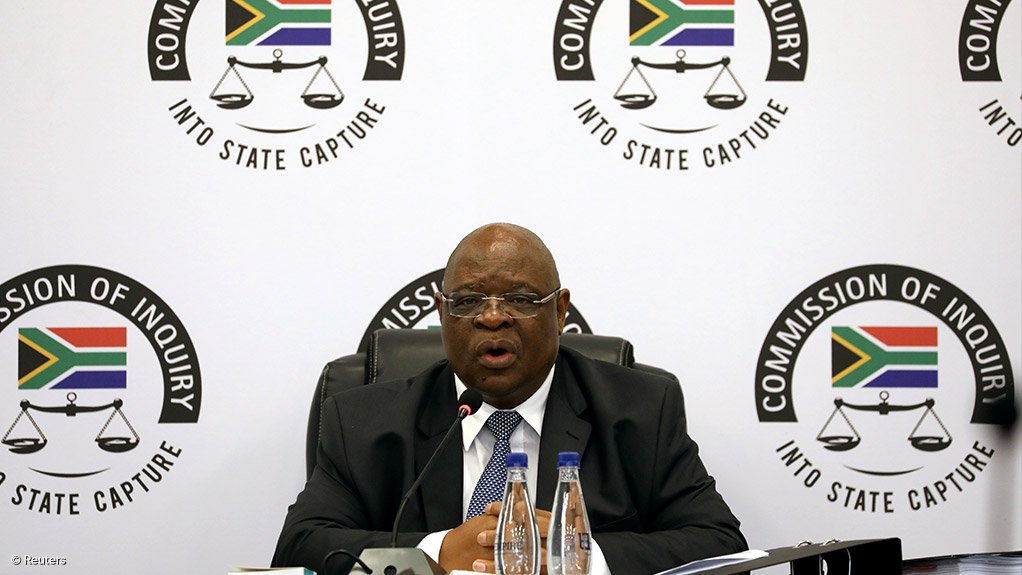/ MEDIA STATEMENT / The content on this page is not written by Polity.org.za, but is supplied by third parties. This content does not constitute news reporting by Polity.org.za.
Acting chief justice and state capture commission chairperson Raymond Zondo has found that just as was the case in Eskom, the now defunct TNA Media – formerly owned by the Gupta family – was favoured within Transnet for irregular contracts worth millions, despite there being no value for the parastatal and no proper procurement processes followed.
Zondo said the same modus operandi used at Eskom – which spent tens of millions of rands between 2012 and 2015 towards irregular sponsorship deals with TNA – was used at Transnet. It too deviated from normal protocols, with former GCEOs Brian Molefe and Siyabonga Gama being responsible for the irregularities during their successive terms.
Molefe’s term spanned the period between February 2011 and March 2015, when he moved to Eskom on a secondment basis. Three of the five contracts entered into between Transnet and TNA were concluded under his watch. Gama’s term saw two contracts for business breakfasts, concluded in April 2015 and March 2016.
Between 2012 and 2017, Transnet spent over R120-million for the TNA business breakfasts that were broadcast on the SABC’s Morning Live programme over the period. It spent a further R24-million as sponsor of The Big Interview, a regular feature of TNA-owned the New Age newspaper, between 2011 and 2016.
Guptas making advances on Transnet
Mafika Mkwanazi, who was the board chairperson from 2010 to 2014, was the first to be approached by the Guptas in January 2011, when Tony Gupta asked to meet him at the family home in Saxonwold, Johannesburg. He testified before the commission that once there, Gupta asked that he facilitate access for TNA to between 30% and 50% of Transnet’s marketing spend per annum. When he told Gupta that this was not within his authority, Mkwanazi testified, the businessman did not react negatively, but an attempt by then minister of public enterprises Malusi Gigaba, months later, to remove him as chairperson appeared to be related to his refusal to submit to the request.
Zondo’s report notes: “in the Cabinet memorandum of 25 May 2011, which recorded the proposal that Mr Gigaba made to cabinet, it is indeed reflected that Mr Gigaba proposed that Mr Mkwanazi be removed as chairman of the board of Transnet and that he be replaced with Mr Iqbal Sharma. However, the outcome of the Cabinet meeting was that Mr Gigaba was unsuccessful and Mr Mkwanazi was not replaced.”
According to Zondo, the Guptas did not struggle to find a facilitator for their state capture project in Molefe.
Transnet officials who testified on the transactions said there was no value derived from the contracts, but Dan Phatlane, who was the stakeholder relations coordinator, was often instructed by GM for shareholder impact Mboniso Sigonyela to draft the memoranda that supported and gave effect to the contracts, despite the former’s reservations. Phatlane also recorded that early termination clauses were removed from the final contracts, despite his warnings that they be included.
According to Phatlane, normal procedure for sponsorship procurement at Transnet involved the following:
- a team would assess whether the proposal was in line with the draft sponsorship and donation policy;
- Transnet would perform a due diligence to check if the request was legitimate and whether it would be helpful to Transnet – it would look for benefits to Transnet and whether those were in line with its objectives;
- a memorandum would then be generated and directed to the GM who had authority to approve the sponsorship if it fell under the amount set out in his delegation of authority;
- if the GM approved it, the sponsorship would be executed and Transnet would ensure it received what was agreed;
- if the monetary amount exceeded the GM’s authorised amount, the proposal would go to a person with higher authority; and
- when a sponsorship was approved, a sponsorship contract would be drafted and, if signed, payment would follow.
Threats and intimidation to ensure compliance
“The first business breakfast proposal was sent by TNA to Transnet in Sept 2011.The proposal was for two breakfasts at a total cost of R1 471 000. The offer contained no detail about value or the nature of the sponsorship ‘opportunity’,” notes Zondo.
“Mr Phatlane explained that Transnet never interrogated why they were being asked to pay for the catering and costs of the breakfast or what value Transnet would be getting out of the sponsorship.
“Mr Sigonyela used threats and intimidation to ensure that his subordinates complied with instructions to advance the interests of TNA. The spend on these contracts was irregular, fruitless and wasteful.”
In the case of The Big Interview, what was initially pitched as an opportunity for exposure that would bear Transnet’s name, and be called The Transnet Big Interview, did not do so in the end. Despite this, it cost Transnet over R300 000 per month.
Although Molefe did not respond to notices from the commission alerting him to being implicated in the TNA contracts, he testified before the commission. “The gist of his [Molefe’s] evidence was that the millions of Rands that were spent on The Big Interview were justified because Transnet needed to ‘move away from paying for adverts and move our brand to the mainstream news . . . and the Big Interview was an opportunity to do that’,” Zondo writes in his report.
“However, this justification does not hold water. The Big Interview did not move Transnet away from paying for advertisements. On the contrary, it cost Transnet handsomely – a total of more than R24-million.”
EMAIL THIS ARTICLE SAVE THIS ARTICLE ARTICLE ENQUIRY
To subscribe email subscriptions@creamermedia.co.za or click here
To advertise email advertising@creamermedia.co.za or click here











